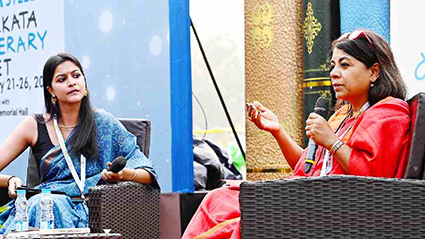
She is a doctoral candidate in Anthropology, as well as a master's student in Ethnomusicology, through the Open Graduate Education program. Palchoudhuri recently visited Bengal, India to take part in the Kolkata Literary Meet and interview Mukulika Banerjee, one of the foremost political anthropologists with a focus on South Asia.
Like Banerjee, Palchoudhuri’s own research is also located in rural West Bengal, where she has been conducting ethnographic research amongst neighboring communities of paddy cultivators, potters and musicians. “One of the important thrusts of my research is to study the relationship between politics and aesthetics, as it is experienced in the everyday life of my interlocutors,” shares Palchoudhuri.
Palchoudhuri first met Banerjee while she was completing her master’s degree in Anthropology at the London School of Economics. Palchoudhuri worked as Banerjee’s research assistant while she was releasing her previous book, Why India Votes. The two kept in touch as Palchoudhuri began her anthropological research of India and West Bengal. “It's a real privilege to have a body of work, such as Mukulika's, from a proximate landscape to think and write in relation to,” says Palchoudhuri.
Banerjee invited Palchoudhuri to interview her at the Kolkata Literary Meet, which is an annual event that includes talks, workshops, book launches, plays, dance recitals and music concerts with prominent speakers from across India and the world.
They discussed Banerjee’s current book, which studies how democracy and the spirit of active citizenship is enacted not only at the time of elections but also in the structures of everyday life where political values and aspirations come to be generated. The interview was also publicized by Telegraph India.
Palchoudhuri shares, “Mukulika's work reminded me that the political needn't be limited to the institutional, and that the differences and hierarchies that order political life often lie latent within ordinary relations of proximity and intimacy, and in the joined commitment to life together.”
During the course of the interview Bannerjee and Palchoudhuri discussed the political as an ethnographic object, the relation between the sacred and the political in the Islamic ritual of Qurbani, the recent Farmers' Protest in India and the limits of democracy as a form of life.
“Mukulika has a wonderful way of revitalizing concepts from the traditional canon of anthropology and situating them within contexts of contemporary political urgency -- so that's an intellectual habit I hope I can inherit,” says Palchoudhuri. She notes that Banerjee’s work over twenty years in the same set of villages is also incredibly valuable for its ability to trace “multiple scales of transformation.”
This was Palchoudhuri’s first time attending the Kolkata Literary Meet. She shares of this event, “I think it's very important to be able to make room for academic writing within the broader domain and public consumption of literature and books. It forces us academics to examine our writing outside the purview of our respective disciplines, and to think and speak to a wider set of intellectual curiosities."